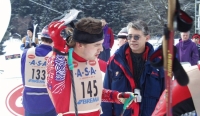The Jizerská 50 started unluckily for him. Today, it warms his heart to see how far it has come
Download image
Josef Vild was born on 26 September 1952 in Oldřichov v Hájích in the Jizera Mountains, where his parents Miloslav and Marie moved in the early 1950s. In 1959 the family moved to Liberec. Josef Vild graduated from the school Na Bojišti and then from the mechanical engineering secondary school. On August 21, 1968 he was fifteen years old. On the first day of the occupation he rode around the then Zdeněk Nejedlý class with his friends between the tanks on motorbikes. In 1965 he joined the TJ Lokomotiva cycling club and took up cycleball. He became friends with the Pospíšil brothers, coaches and successful cycleball players. From 1981 he was on the committee of TJ Lokomotiva Liberec and in 1985 he was elected its chairman. Two years later he became the chairman of the organizing committee of the Jizerská 50 after Josef Jelínek. He managed the organizers until 2001. Since 1999 Jizerská 50 has been part of the prestigious Worldloppet series. In total, he organized fourteen Memorials of the 1970 Peru expedition. The famous fifty kilometre run was not held three times due to lack of snow - in 1988, 1990 and 1998. Until 1989, he worked at the Liberec Air Engineering Works. After the revolution he worked as a personnel manager. In 2023 he was living in Liberec. We were able to record his story thanks to financial support from the Statutory City of Liberec.
